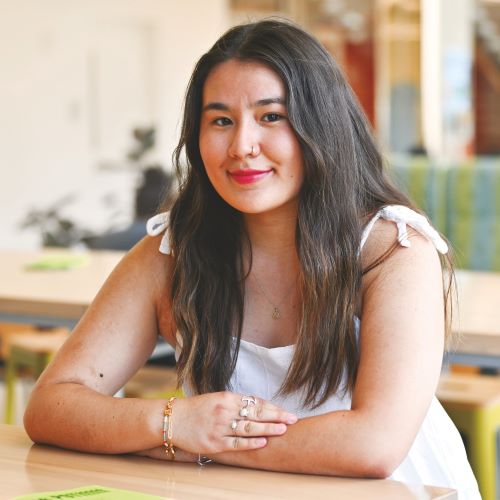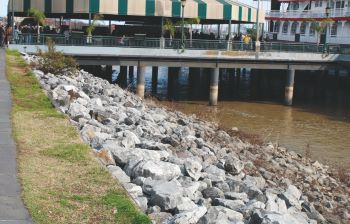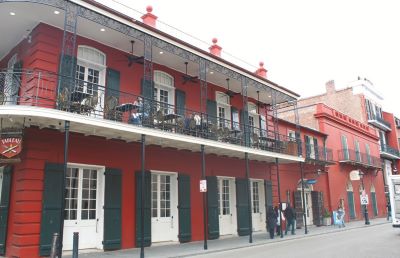
An urban study on resilience inspires desire to implement change in disaster preparedness processes

As climate change intensifies the severity and frequency of extreme weather events, it’s also impacting mental health. Concerns about worrisome climate change and the lack of global action are leading people to higher stress and anxiety levels, and psychologists predict a rise in cases of post-traumatic stress disorder.
Nearly 20 years after Hurricane Katrina devastated New Orleans in August 2005, it remains the costliest natural disaster in U.S. history, and New Orleans is still 20% below its pre-storm population numbers. The trauma of waiting for rescue while lying on attic rafters for a week with no food or water persists, as does the financial toll for many families who survived. Could remediation of the physical environment ease these emotional burdens?
Hope Carmody ’23 is too young to recall Hurricane Katrina personally, but the devastation it caused piqued an interest in how urbanists redesign cities after a natural disaster. As she considered this topic in her spring 2022 Urban Studio class at The College of Wooster, her specific questions around the resident experience post-disaster inspired her to pursue the topic for a senior Independent Study project. Assistant Professor of Urban Studies Hamed Goharipour taught Carmody for three years and served as her I.S. mentor. “Post-disaster urban reconstruction is a comprehensive process that involves more than just rebuilding structures and infrastructures,” Goharipour said. “It also involves addressing the disaster’s physical, social, and psychological impact on the affected individuals and communities.”
“The chance to give people a voice and represent their experience and their opinions when they haven’t necessarily been given that opportunity was really important to me.”
—Hope Carmody ’23, I.S. title: Post Disaster Urban Reconstruction’s Effect on Mental Health: A Case Study on Hurricane Katrina and New Orleans Residents, mentor: Hamed Goharipour, assistant professor of urban studies
While there’s a lot of existing research on the hurricane and how the government responded, Carmody was intentional about taking more of a community-based approach to fill some of the gaps in literature. Starting in August 2022, Carmody reviewed existing data from the hurricane and the government’s highly criticized response via the Federal Emergency Management Agency (FEMA). Then she received competitive Copeland Funding to cover the cost of flights and hotel expenses for a field-research trip and traveled to New Orleans in January for first-person interviews with residents and to observe the physical spaces and disaster-related practices.

Carmody captured this picture of Steamboat Natchez showing breakwater rocks on the shorelines near the pier used to catch sediment and reduce wave energy, effectively reducing wave impact. Photo by Hope Carmody
“The chance to give people a voice and represent their experience and their opinions when they haven’t necessarily been given that opportunity was really important to me,” said Carmody. She asked residents about shortcomings in the aid process and whether certain communities appeared to receive better treatment. “Residents are still affected financially, and one person told me they were still trying to get their FEMA relief money,” she said.
Carmody also evaluated urban green spaces in neighborhoods with varying demographics to see how design has been used for functionality and to support a sense of community. Some nice green spaces exist, but most were in upscale areas while those in lower-income neighborhoods were not really usable. On the flood-prevention side, she evaluated locations of sea walls, raised houses, and generator access. Ultimately, she found that rebuilding efforts didn’t reach all residents, and gaps in flood-prevention practices exist across town.
“There’s a lot that needs to be reevaluated in terms of how certain communities are able to access resources,” said Carmody. “There are people who are overlooked, so restructuring in a way that is more equitable is important.”
Despite the challenges residents faced with inequitable access to recovery resources, Carmody found that most interviewees coped with the hurricane in healthy ways by relying on family and friends for support, with some going out in the community to help others. The psychological resilience of residents proved stronger than the physical environment’s resilience against Katrina.

Carmody captured this picture of Steamboat Natchez showing breakwater rocks on the shorelines near the pier used to catch sediment and reduce wave energy, effectively reducing wave impact. Photo by Hope Carmody
Carmody says she built confidence throughout Goharipour’s mentorship and in classes that equipped her to handle a demanding solo research trip. “Ethical concerns such as data privacy, informed consent while doing interviews, and cultural sensitivity while working with the local population were among the essential factors Hope considered perfectly,” said Goharipour.
On and around campus, Carmody works to build community as a resident assistant and an intern at Main Street Wooster (MSW), a nonprofit that aims to draw more people downtown. She visited the organization with the Urban Studio class and later reached out about developing an internship. MSW was on board, and she’s been with them since August 2022. In that time, she developed Wooster’s first ever Park(ing) Day, held on Sept. 24, which is a global participatory project that repurposes parking spaces for social exchange, artistic expression, and play. Wooster elected to create little “parks” in several spots with fake grass and lawn games to draw people around town.
“It’s called tactical urbanism,” said Carmody. “It’s a way for everyday people to get more involved in urban design and how they want to use spaces within their city since it can be hard to see change on that level when you’re not in the city planning office.”
One day, Carmody would love to work in a FEMA office or elsewhere in the disaster preparedness and management field. “I learned a lot about the human experience through my case study,” said Carmody. “I’d like to work in a field that benefits many people and makes a difference in society by implementing change to the disaster preparedness process.”
Posted in Independent Study on August 3, 2023.
Related Posts
Related Areas of Study
Urban Studies
An interdisciplinary program for those with a passion for the promises and challenges of the urban experience.
Major MinorPsychology
Do research, work with faculty mentors, and tailor a psychology program to your interests
Major Minor

